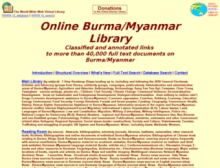Resource information
... Myanmar’s forest and timber sector has been central to the country’s economy and society, particularly over the last century. Since the colonial era, timber has been a major export revenue earner to Burma/Myanmar and thus subject to much political debate (Bryant 1996). In addition to timber export revenues, the forests of Myanmar have always provided timber and non-timber forest products for domestic consumption as well as a range of environmental services including water catchment, habitat for flora and fauna, carbon storage, and soil nutrient recovery in rotational agriculture.
Myanmar’s forests have contained some of the most valued timbers in the world – particularly rosewoods and teak. Now, amidst unprecedented political reforms in Myanmar, the forest and timber sector is currently undergoing a process of reform. This is indicated by a number of policy changes, most significantly:
1. The 2014 Log Export Ban – which has made it illegal to export unprocessed logs
2. The Government’s engagement in a Voluntary Partnership Agreement (VPA) process with the European Union’s Forest Law Enforcement Governance and Trade (FLEGT) initiative, requiring transparency and compliance improvements that are mutually agreed upon between the government, the timber sector and civil society.
This policy redirection is essential, although long overdue. Practical implementation is inevitably going to take time and face obstacles as powerful political-economic interests allied to the former military regime will seek to maintain their access to timber and land as well as control over revenue flows associated with the commercial utilisation of these national resources.
Meanwhile the Ministry of Environment Conservation and Forestry (MOECAF) is under strong pressure from international timber traders to increase supply, more evidently recent pressure from China, and also missions from European and US timber sector representatives. This pressure is due to a combination of factors; growing demand around the world, declining supply of tropical hardwood from shrinking forests, and growing stringency around compliance concerning illegal sourcing.
In order to respond to these pressures the authors have tried to clarify the status of the timber industry, the status of the forest resource including its management, and the challenges for reform...


